Yann protested, "I’ve been contemplating this for almost six months."
"Since I arrived? I’m flattered. But then, who else would you dare to ask?"
Yann smiled abashedly. "How could I not be curious? It’s what flesh is famous for. However undeservedly." He watched Tchicaya carefully, serious for a moment. "Have I hurt you?"
Tchicaya shook his head. "That usually takes longer, too." He hesitated. "So what do acorporeals do, instead? When I was a child, I used to imagine that you’d all have simulated bodies. Sex would be just like embodied sex, but there’d be lots of colored lights, and cosmic bliss."
Yann guffawed. "Maybe twenty thousand years ago there were people that vacuous, but they must have all decayed into thermal noise before I was born." He added hastily, "I’m not saying you’re wrong to continue the tradition. You’ve mapped some stable mammalian neurobiology, and it’s not too pathological in its original form. I suppose it still serves some useful social functions, as well as being a mild existential placebo. But when you have a malleable mental structure, intensifying pleasure for its own sake is a very uninteresting cul-de-sac . We worked that out a long time ago."
"Fair enough. But what do you do instead?"
Yann sat up and leaned against the side of the bed. "All the other things the embodied do. Give gifts. Show affection. Be attentive. Sometimes we raise children together."
"What kind of gifts?"
"Art. Music. Theorems."
"Original theorems?"
"If you’re serious."
Tchicaya was impressed. Mathematics was a vast territory, far more challenging and intricate than physical space. Reaching a theorem no one had proved before was a remarkable feat. "That’s positively…chivalric," he said. "Like a knight riding off to the edge of the world, to bring back a dragon’s egg. And you’ve done that, yourself?"
"Yes."
"How often?"
"Nine times." Yann laughed at Tchicaya’s expression of astonishment, and added, "It’s not always that serious. If it was, it really would be as daunting as winning the hand of medieval royalty, and no one would bother."
"So you start with something easier?"
Yann nodded. "When I was ten years old, all I gave my sweet-heart was a pair of projections that turned the group of rotations in four dimensions into principal bundles over the three-sphere. Ancient constructions, though I did rediscover them for myself."
"How were they received?"
"She liked them so much, she extended them to larger spaces and gave me back the result."
"Can you show me?"
Yann sketched diagrams and equations with his hands; through their Mediators, Tchicaya saw them painted in the air. To make sense of the group of four-dimensional rotations, you could project it down to the three-dimensional sphere of directions in four dimensions, by mapping each rotation to the direction to which it took the x-axis. All the rotations that treated the x-axis in the same way then differed from each other by rotations of the other three directions. This effectively sliced the original group into copies of the group of three-dimensional rotations — which was just a solid sphere with opposite points on its boundary glued together, since any pair of rotations around opposite axes became equal once you reached one hundred and eighty degrees. Like an artful rendering of depth in a painting, these striations made the topology of the larger group much clearer.
"The other projection inverts all the rotations first, so it turns the whole construction inside out." Yann demonstrated, smiling nostalgically. "I know it’s sentimental, but the first time always stays with you."
"Yeah." The mathematics was simple, but it struck Tchicaya as having all the charm of an embodied child’s handmade gift.
"So what about you?"
"I’ve generally had more success with flowers."
Yann rolled his eyes. "Your own first love. What was that like?"
Tchicaya contemplated lying, but he usually did it badly. And what would he say? He wasn’t going to substitute someone else, writing Mariama out of his life.
He said, "I can’t tell you."
"Why not?" Yann was twice as eager for the details, now. "How embarrassing can it be, four thousand years later?"
"You’d be surprised." Tchicaya struggled to think of a way to deflect the inquiry without piquing Yann’s curiosity further. "There’s much better story I can tell you," he said. "About my father’s first love. Can I trade that instead?"
Yann agreed, reluctantly.
"When my father was fourteen," Tchicaya began, "he fell in love with Lajos. It started in winter, when they used to sneak into each other’s houses at night and sleep together."
Yann said, "Why did they have to sneak? Would their parents have stopped them?"
Tchicaya was momentarily at a loss for an answer; he’d never had to explain this before. "No. Their parents would have known. But it’s more enjoyable to pretend that it’s a secret."
Yann seemed slightly bemused by this claim, but willing to take his word for it. "Go on."
"By summer, they were giddy with it. They could touch and kiss, nothing more, but they knew it wouldn’t be much longer. They’d go swimming together, walking together, waiting for it to happen. Aching this wonderful ache." Tchicaya smiled, hiding a sudden upwelling of sadness. He doubted he’d ever return to Turaev, to talk to the stranger his father had become.
"At the height of summer, they were walking on the outskirts of town. And my father witnessed the strangest, most terrifying event that had happened on Turaev for a thousand years. A spaceship descended from the sky. An ancient engine, spouting flames, burning up crops, melting rocks."
Yann was outraged. "And Lajos — " He struggled with his emotions. "Your father saw Lajos — "
"No, no!" Tchicaya was amused at the preposterousness of this suggestion, but he still warmed to Yann’s response. He’d met bigots who would have assumed that an acorporeal would shrug off the notion that witnessing the local death of your first love would be of any consequence at all.
"Not even anachronauts land their spacecraft on top of people," he explained. "They do have instruments."
Yann relaxed. "So your father and Lajos got to meet the anachronauts. What were they like?"
"They’d left Earth fourteen thousand years before. Pre-Qusp. They used biological techniques to keep their flesh viable, but they spent a lot of time cryogenically suspended."
" Cryogenically suspended ." Yann was mesmerized. "I always knew they were out there, but I’ve never met anyone before who’s spoken to someone who’s seen them in the flesh." He shuddered with vicarious otherworldliness. "What did they want?"
"When they left Earth, they knew they’d be overtaken by newer technologies; they knew they’d be traveling into the future. They knew there’d be established societies along their route. That was why they left. They wanted to witness what humanity would become."
"I see." Yann appeared to be on the verge of raising another objection, but then he let it pass.
"They had one particular interest, though," Tchicaya continued. "They told my father that they wanted to know what stage his people were in, in the eternal struggle between women and men. They wanted to hear about the wars, the truces. The victories, the compromises, the setbacks."
"Wait. How old is your father now?"
"About six millennia."
"So…" Yann rubbed his neck, perplexed. "Turaev was the very first planet they’d visited? After fourteen thousand years?"
"No, they’d made planet-fall six times before."
Yann spread his arms in surrender. "You’ve lost me, then."
"No one had had the heart to tell them," Tchicaya explained. "When they first made contact with a modern society, on Crane, it took a while before they were sufficiently at ease to reveal their purpose. But by the time they got around to asking questions, the locals had already gained a clear sense of the kind of preconceptions these travelers had. They’d been in cold storage for millennia, and now they were finally beginning the stage of their voyage that would justify the enormous sacrifices they’d made. Nobody could bring themselves to break the news that the sole surviving remnant of human sexual dimorphism was the retention, in some languages, of different inflections of various parts of speech associated with different proper names — and that expecting these grammatical fossils to be correlated with any aspect of a person’s anatomy would be like assuming from similar rules for inanimate objects that a cloud possessed a penis and a table contained a womb."
Читать дальше
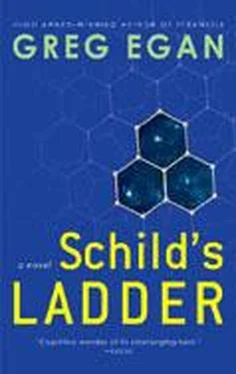
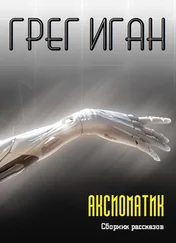
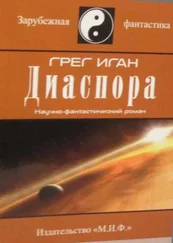
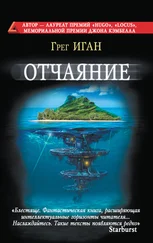
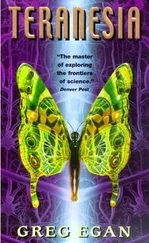
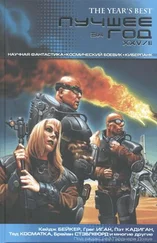
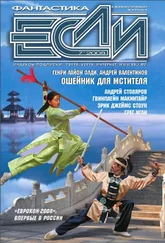

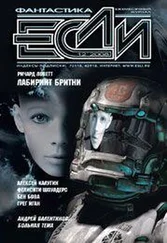
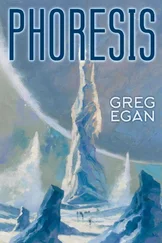
![Грег Иган - Рассказы [компиляция]](/books/419837/greg-igan-rasskazy-kompilyaciya-thumb.webp)
